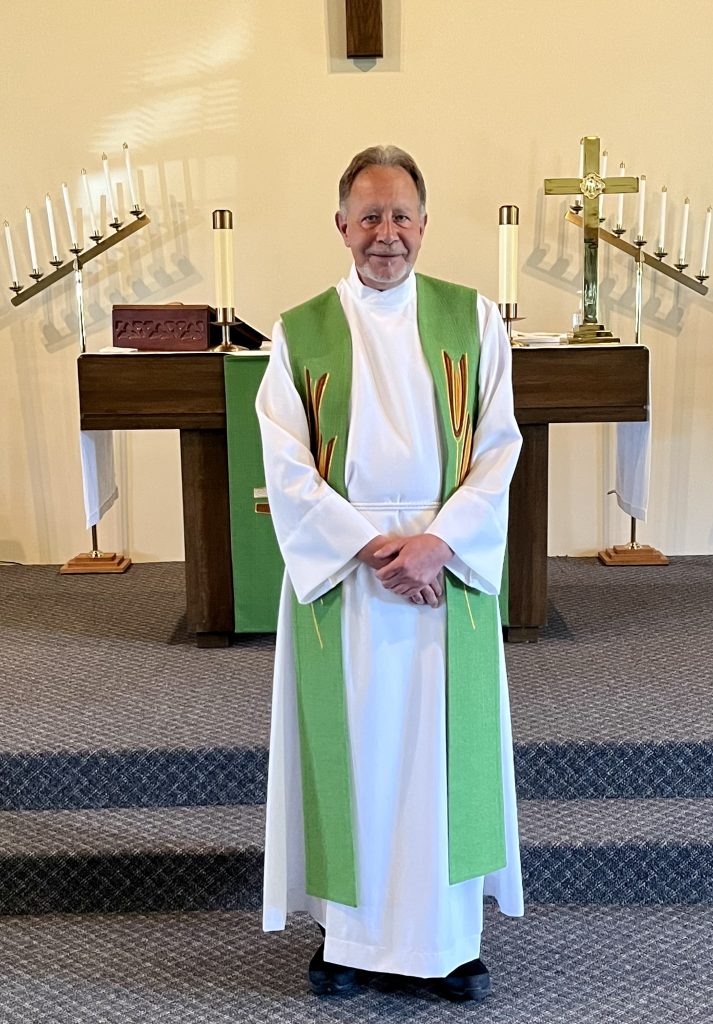About Us
Our Grip On God’s Word
the History
While the presence of Lutheran Churches in Oconomowoc was fairly well established and rooted by the early 1970’s by the larger Lutheran Synods of America, there was no church in the area from the Lutheran Church in America (LCA). Through the vision of the Mission Board of the Lutheran Church in America, land was purchased in 1975 at Lord of Life’s present location on the northeast corner of Cty. Roads P & Z.
Thus, a small Lutheran Church on the northeast side of Oconomowoc was poised to strengthen it’s grip on the truth of God’s Word and the certainty of salvation and share it with the surrounding community. Because of Lord of Life’s grip on the truth of God’s Word, the congregation united around these foundational beliefs of Holy Scripture on which confessional Lutherans stand: “By Grace Alone, By Faith Alone, By Scripture Alone.”
Not long after Lord of Life’s 10th anniversary on April 5, 1987, this congregation joined the Evangelical Lutheran Church in America (ELCA) in 1988. The decision was later made, and we currently are, a member of the NALC, North American Lutheran Church.
Hear From Pastor Mike

September 1, 2024
“Do not merely listen to the word, and so deceive
yourselves. Do what it says.” — James 1: 22
During the month of September, we will be looking at one of the most controversial books of the New Testament, under the theme: “Spiritual Bootcamp: A Journey Through James.” This book packs a wallop and is not for the weak-hearted! Tradition says that James, the brother of Jesus, was the author of this letter, but we really do not know for sure (James was a popular name in Jesus’ day). What we do know is that this epistle was written by a Jew Christian for other Jewish Christians who were scattered throughout the Roman Empire.
Martin Luther really struggled with the book of James to the point where he said some derogatory things about it. The main problem he had was that the author’s words seem to stand in contradiction to the main doctrine of St. Paul: salvation by grace through faith. In his letter to the Ephesians, Paul clearly states, “For it is by grace you have been saved, through faith—and this is not from yourselves, it is the gift of God— not by works, so that no one can boast” (Ephesians 2:8-9). This teaching was a common thread that ran throughout many of Paul’s letters. James directly contradicts this when he writes, “a person is considered righteous by what they do and not by faith alone” (James 2:24). It may surprise you, but Luther was so perturbed by this epistle that he excluded it from his German translation of the New Testament and affixed it as an appendix to the Bible (along with Hebrews, Jude, and Revelation!). Obviously, we accept all four of these books as inspired by God and part of His revealed Word. At times, even the greatest of people can make mistakes.
But we are still faced with the same dilemma that troubled Luther: are we made righteous before a Holy God through faith alone or must we also perform good works in order to be saved? The analogy of a tree may prove helpful here. For the Christian, faith is the root of the tree. Without a root, a tree is not able to live because it takes its necessary nutrition and moisture from the soil. Cut off its roots and the tree dies. Likewise, without faith, a person is spiritually dead. Good works, on the other hand, are the fruits of a tree. They exist to bring joy and nourishment to others. Hence, a tree with deep roots will not only be healthy, but helpful to others.
In actuality, Luther reconciled the tension between faith and good works in many of his most famous quotes. One of his best in found in the preface to the book of Romans: “Faith is a living, busy, active, powerful thing! It cannot do anything except good. It does not even ask which good works ought to be done; even before the question can be asked it has done them and is constantly at work doing good.” In that same preface, Luther said that it was just as impossible to separate faith and good works as it is to separate heat and light from fire. We are saved by faith alone, but faith is never alone. Rooted in Christ is the only way we can produce good fruit.
So, what have you done for others this week, without a thought of reward or recognition? Even Jesus said, “Make a tree good and its fruit will be good, or make a tree bad and its fruit will be bad, for a tree is recognized by its fruit” (Matthew 12:33). Instead of “Boot Camp,” maybe I should call it “Root Camp.” Or “Fruit Camp.”
Your servant in Christ,
Pastor Mike
August 2024
“Shout for joy to the Lord, all the earth, burst into jubilant song with music.” — Psalm 98:4
Music is a universal phenomenon. Every culture that exists, or has ever existed, has had music as part of its heritage. Even young babies between the ages of 6 months to a year can learn short musical phrases that they can repeat at will. All people are born with an inherent sense of song within their souls. So don’t tell me you can carry a tune; you have been doing it since the day you were born!
The ancient Hebrews were no different. In addition to poetry and song being sprinkled throughout the Scriptures, they had an entire book dedicated to this art form: the Psalms. Psalms was the hymnbook of the Jews in Jesus’ time. Our Lord and His disciples sang a hymn after celebrating Passover, on the way to the Garden of Gethsemane. Scholars tell us that this was probably Psalm 118, the hymn traditionally sung at the end of the Passover meal. I would recommend that you read this psalm for yourself and see how very apropos it is, considering that only hours later, our Lord would be hanging on a cross.
During the month of August, I will be doing something that I’ve never done before: preach from the Psalms! Every Sunday, between the first and second readings for the day, we read a portion of the Psalms responsively. In ancient Israel, these were the songs that were sung at the Temple in Jerusalem with a musical accompaniment. And, while we will never know the melody that they used, we do have their original lyrics translated into English. Unlike most of our hymns, the authors of the Psalms were not concerned with meter and rhyme. Therefore, I will explain some of the major components of Hebrew poetry during my sermons in August.
What I do like about Hebrew Poetry is its brutal honesty. There are no sugar-coated doggerels in the Psalms. David and his co-authors tell things like they are, with no attempt to mask their raw emotions. At times, the Psalms are exhilarating and jubilant. Other times, they are despondent and even vengeful. And then there is the 23rd Psalm which has brought comfort and strength to millions of people for over 28 centuries. In their own unique fashion, the Psalms are poetry, prayer, prophecy, and song all rolled into one!
Where do you sing? In the shower? In your car when a favorite tune pops up on the radio? In your house when no one is listening? I see music as an amplifier of our emotions. Whatever we are feeling at the moment, music intensifies it! That is why armies sing before going into battle. It is one thing to say, “I love you” and quite another to sing a song to your beloved (when is the last time you serenaded husband or wife?). And nothing stirs and strengthens faith like heart-stirring hymns such as “A Mighty Fortress” or “How Great Thou Art.”
There are times when I hear the closing hymn in my head for hours after worship ends. But that is no surprise. Music is like carrying a little bit of God home with you.
Your servant in Christ,
Pastor Mike
